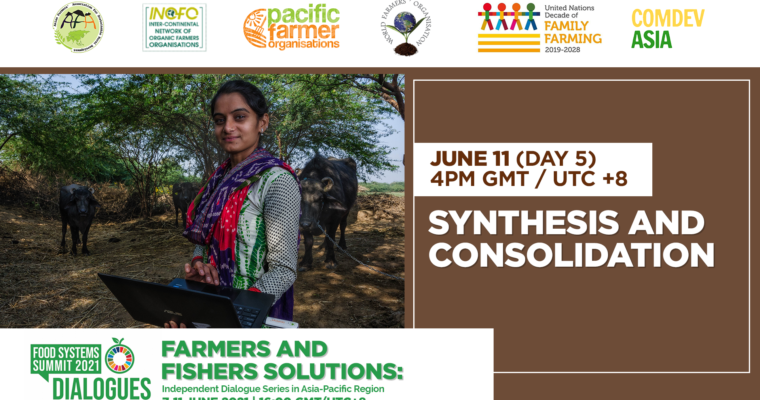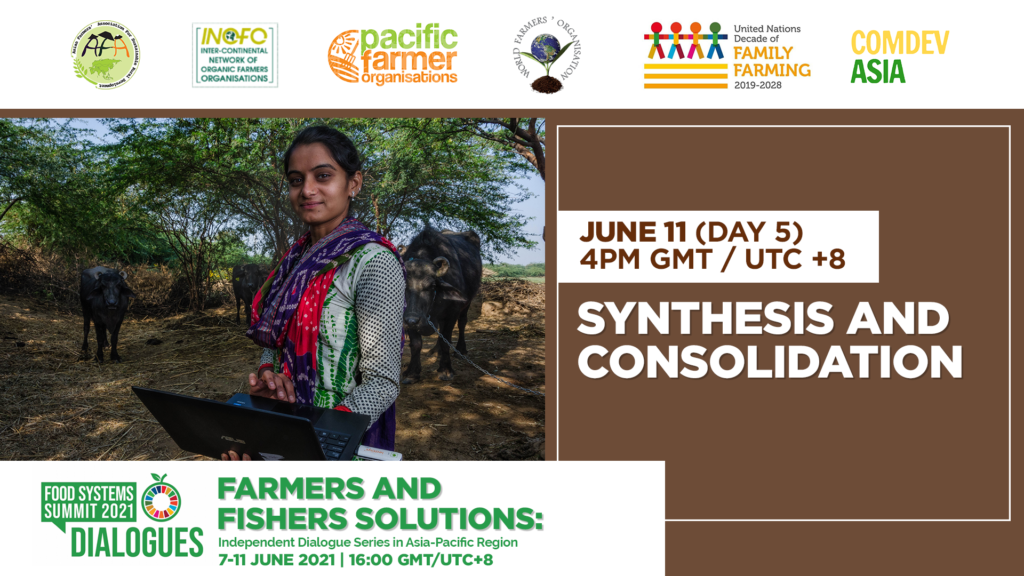Synthesis and consolidation
Lead Organizer: Asian Farmers Association for Sustainable Rural Development (AFA)
June 11, 2021, 4:00 PM – 6:00 PM Philippine Standard Time (16.00-18.00 UTC+8)
REGISTER HERE
Background
Understanding the Food Systems Summit
The UN Secretary-General, António Guterres, has called on all world leaders to take part in the Food Systems Summit in 2021 to help establish the future direction for food systems in the world and accelerate collective action to that end. This reflects the recognition that transforming food systems is central in efforts to achieve all the 17 Sustainable Development Goals (SDGs) by 2030. The Summit will be held in New York in September 2021 and will be preceded by a Pre-Summit in Rome in July 2021.
The Food Systems Summit will launch new actions to deliver progress on all 17 SDGs, each of which relies to some degree on healthier, more sustainable, and equitable food systems. The Summit expects the following outcomes:
- Dramatically elevated public discourse about the importance of food systems leading to the achievement of the SDGs.
- Significant action, with measurable outcomes. (This will include highlighting existing solutions and celebrating leaders in food systems transformation, as well as calling for new actions worldwide)
- A high-level set of principles established through the process that will guide Member States and other stakeholders to leverage their food systems capacity to support the SDGs.
- A system of follow-up and review that will drive new actions and results; allow for sharing of experiences, lessons and knowledge; and incorporate new metrics for impact analysis.
However, debates are surfacing as to what direction the food systems summit will take to ensure that issues on hunger, malnutrition, social justice, and the planet will be at the fore of these solutions. A revisit and evaluation of our present food system is also imperative if we are to chart a transformative, just, resilient, and sustainable food system that puts the interests and needs of food producers and consumers across the globe. As such, they said summit matters to everyone, from the food producers to the consumers, and has never been timelier given the challenges of the Covid-19 pandemic.
Food Systems Summit Dialogues
In preparation for the Summit, the UN Special Envoy for the Food Systems Summit Dr. Agnes Kalibata has invited all sectors of society to share their perspectives and solutions. These Dialogues obtain input from a global audience (from youth activists to indigenous leaders, from smallholder farmers to scientists and CEOs) both before and after the Summit with the aim to transform the way the world produces, consumes, and disposes of food.
Independent Summit Dialogues, such as this event facilitated by Farmers Forum, will only connect to the Summit process through an official feedback mechanism. Independent Summit Dialogues will offer opportunities and spaces for citizens to critically engage and propose pathways towards sustainable food systems, exploring new ways of working together and encouraging collaborative action. The outcomes of the Dialogues will feed into the Summit’s five priority Action Tracks and the preparatory work of its Scientific Group to support changes in global food systems to deliver the SDGs by 2030.
Farmers’ contribution to food systems transformation
Farmers and fishers are key players in transforming the current agri-food systems to one that can deliver on food and nutrition security, socio-economic and environmental outcomes. Figure 1 shows how farmers’ interventions and innovations along the food system can contribute to achieving sustainable, empowering, and just food systems and associated outcomes for the people and the planet.
|
Figure 1. Farmers’ contribution to food systems transformation
Family farmers and fishers play multidimensional roles – producing food, conserving the natural environment, custodians of biodiversity, knowledge producers, and social and cultural agents. They have shown that they can develop innovative solutions and strategies to address the challenges affecting them and their communities. It is through their organizations and cooperatives with sufficient support from the government and resources institutions, family farmers are able to address challenges and barriers they face in playing their roles in the food systems.
Globally, there are 600 million farms and more than 90 percent of farms are managed by an individual or family[1]. Meanwhile, 33 percent of forests are managed by local communities and indigenous groups. Ninety percent of 38 million fishers are considered small-scale. The Asia-Pacific is home to 60 percent of the world’s population and 70 percent of family farmers. About 90 percent of the world’s 30 million fishermen work in Asia. Eighty percent of the region’s food comes from small-scale food producers, farmers, forest producers, fishers, and herders[2]. Thus, recognizing the central role of family farmers and fishers in building sustainable and healthy food systems across Asia-Pacific and putting them at the heart of interventions is the important first step in the transformation process.
Despite their role in the food systems, small-scale farmers and fishers face multifaceted challenges including lack of control over natural resources and exploitation from other food supply chain actors such as traders, credit, and service providers. It is also known that farmers and fishers are more likely to experience hunger and that they are often marginalized in the various processes and changes such as economic growth, research and technology development, and policy or program development and implementation.
Farmers and fishers organizations and cooperatives play a critical role in enabling individual farmers to address their challenges and to overcome barriers, becoming an active player in the food supply chain from production to marketing. By forming strong organizations and cooperatives, farmers and fishers are able to negotiate for their rights to productive resources and services, fair prices for their products, enter into partnerships with public institutions and private companies, and participate in decision-making processes. The CERES 2030 found that “membership in a farmers’ organization was associated with positive effects on income in 57% of the cases reviewed”. It is also through their organizations and cooperatives that farmers can have access to farm inputs and services at reduced costs and loans with lower interest rates.
Thus, the creation of enabling environment at the national level coupled with support from various institutions are needed to unleash the potential of farmers and fishers and their organizations to extensively contribute to food systems transformation.
Objectives
The event is an opportunity for farmers and fishers to be heard by governments and key institutions advancing the transformation of food systems. Specific objectives are:
- To consolidate proposed farmers and fishers solutions in the areas of climate change adaptation, agroecology and organic production systems, sustainable fishing, and increasing market power of farmers and fishers, and scaling out and scaling up strategies
- To secure support and commitment from development agencies and other institutions
- To identify partnerships and collaborative endeavors between farmers’ and fishers’ organizations and key institutions.
Participants
Target participants are farmers and fishers, NGOs, academe, local and national government agencies officials, international partners and other support groups.
Program
Moderator: Myline Macabuhay, Program Coordinator, AFA
| Time
(Philippine time) |
Topic | Speaker/s |
| 3:50 – 4:00 PM | Admission of Participants in Zoom Conference | Irish Dominado
Communications Officer, AFA |
| 4:00 – 4:05 PM | Opening message | Aggie Altantuya
Vice-chairperson, AFA |
| PART 1 | ||
| 4:05 – 4:10 PM | Recap of the 4-day dialogue | Irish Baguilat
Program Manager, AFA |
| 4:10 – 5:00 PM
|
Key messages and recommendations
(8 mins each) Climate change adaptation
Agroecology and organic production systems
Sustainable Fishing
Increasing market power of farmers
Q&A |
Lavinia Kaumaitotoya, Program Manager, PIFON
Rowena Buena Program Manager, INOFO
Pooja Moitra IMSE
Jose Romeo Ebron Program Manager, AFA |
| 5:00 – 5:20 PM
|
Updates, recommendations, and reflections(5 mins each) | Action tracks chairs/ representative |
| PART 2 | ||
| 5:20 – 5:40 PM
|
Presentation: Strengthening FOs
Resource generation and financing models for farmers’ organizations
Q&A/open discussions |
Maria Elena V. Rebagay Program Manager, AFA
|
| 5:40 – 5:50 PM
|
Reactions
(5 mins each)
|
Ron Hartman
IFAD (TBC) FSS Secretariat (TBC) |
| 5:50 – 5:58 PM | Summary of discussions, Part 2 | Lavinia Kaumaitotoya |
| 5:58 – 6:00 PM | Ways forward and closing | Esther Penunia
Secretary-General, AFA |
[1] FAO and IFAD. 2019. United Nations Decade of Family Farming 2019-2028. Global Action Plan. Rome. Licence: CC BY-NC-SA 3.0 IGO
[2] FAO.nd.Family Farming in Asia and the Pacific





Comments are closed